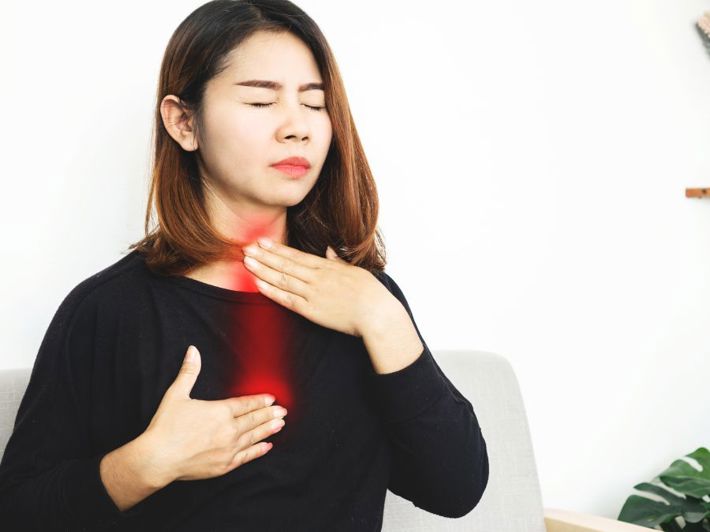Gastroesophageal reflux disease (GERD) is a condition that occurs when stomach acid flows back from the stomach into the esophagus due to a malfunction in the pyloric sphincter muscle located between the stomach and esophagus, causing a variety of bothersome symptoms. (1) Learn about the main symptoms of GERD and how to manage them!
Symptoms of GERD
The two most common symptoms of GERD are: (2)
- Acidity or heartburn: A severe burning feeling in the middle of the chest, directly behind the rib cage bone, extending from the bottom to the throat
- Food reflux: From the stomach up to the esophagus and throat.
However, not everyone may experience both heartburn and food reflux, and GERD symptoms tend to get worse after eating, bending, or lying down.
Some people experience less common symptoms, such as: (3)(4)
- Chest Pain.
- Nausea and /or vomiting.
- Difficulty and pain while swallowing.
- The possibility of symptoms or complications occurring in the mouth, throat, and lungs, such as hoarseness, recurrent sore throat, cough, and a feeling of a lump in the throat.
- Bad breath. (5)
- Wheezing (hearing a whistling sound when breathing). (5)
Do you suspect you have GERD? Do not hesitate to visit the Gastroenterology Department At Al-Ahly Hospital. Our department is qualified with a distinguished medical staff and equipped with the best devices and equipment to diagnose GERD and determine appropriate treatment methods.
When should you see a doctor?
You should see a doctor in the following cases: (3)(4)
- Constant vomiting.
- You feel difficulty swallowing food, as if food is stuck in your throat.
- You have severe and recurring symptoms.
- You take heartburn medications more than twice a week.
- You have symptoms that indicate bleeding in the digestive system, such as: hematemesis or is coffee color vomiting, hematochezia or melena.
- You have no appetite and you lose weight significantly.
- You are over 50 years old, and you are starting to have new abdominal pain.
How do you manage GERD symptoms?
You can alleviate the symptoms of GERD by making some modifications to your lifestyle, such as: (3)
- Eat small, frequent meals, throughout the day and avoid large meals.
- Avoid foods that make your symptoms worse Such as coffee, chocolate, and fatty and spicy foods.
- Avoid sleeping immediately after eating Try to wait at least 2-3 hours after eating your last meal before going to sleep.
- Elevate your head while sleeping using several pillows helps prevent stomach content from returning to the esophagus during sleep.
- Lose excess weight if you are overweight or obese.
- Quit smoking if you are a smoker, you can consult a specialist about appropriate ways to help you.
- Use medications that alleviate the severity of symptoms, such as antacids and heartburn medications.
If the previous options are not enough to relieve the symptoms of GERD, the doctor may recommend one of the following options: (3)
- Prescribing more effective and powerful medications to relieve stomach acidity.
- Add other medications according to your condition and health status.
- Endoscopy to investigate the reason of the acidity.
What are the signs of improvement from GERD?
The most important signs of recovery from GERD is the gradual improvement and disappearance of symptoms associated with GERD, such as: (4)
- The cough gradually disappears.
- The acid does not return from the stomach to the throat, which reduces the feeling of heartburn and the bitter and sour taste in the mouth.
- Chest pain disappears.
- The sound gradually returns to normal.
- Ease of swallowing and no pain during swallowing.
- Improves the ability to sleep at night, as nocturnal symptoms disappear.
References
- GERD | Gastroesophageal Reflux Disease - MedlinePlus
- 9 GERD symptoms to know - Harvard Health
- Patient education: Gastroesophageal reflux disease in adults (Beyond the Basics) - UpToDate
- Symptoms & Causes of GER & GERD -NIDDK
- GERD Cough, How Do You Stop It? - GI Associates






